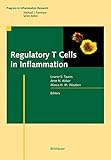Regulatory T Cells in Inflammation [electronic resource] / edited by Leonie S. Taams, Marca H. M. Wauben, Arne N. Akbar.
Series: Progress in Inflammation ResearchPublisher: Basel : Birkhäuser Basel, 2005Description: XI, 240 p. online resourceContent type:- text
- computer
- online resource
- 9783764373016
- 616.079 23
- QR180-189.5
 eBooks
eBooks
Origin, function and distribution of regulatory T cells -- History of CD25+CD4+ regulatory T cells -- “Natural” and “induced” regulatory T cells — purpose and problems associated with an emerging distinction -- The role of interleukin-10 in regulatory-T-cell suppression: reconciling the discrepancies -- Activation and distribution of regulatory T cells in naïve and antigen-stimulated immune systems -- Regulatory T cells and the innate immune system -- The potential use of regulatory T cells in immunotherapy -- Exploiting the potential of regulatory T cells in the control of type 1 diabetes -- Regulatory T cells in type 1 autoimmune diabetes -- The potential for targeting CD4+CD25+ regulatory T cells in the treatment of multiple sclerosis in humans -- Immunotherapy of rheumatoid arthritis using CD4+CD25+ regulatory T cells -- Potential for manipulation of regulatory T cells in treatment or prevention of allergic disease -- The role of regulatory T cells in cutaneous disorders -- The potential role of CD25+CD4+ regulatory T cells in the induction and maintenance of transplantation tolerance in humans.
Regulatory T-cells are essential components of the immune system, and several different subsets of regulatory T-cells have been described. Considerable regulatory function has been attributed to the CD4+CD25+ T-cell subset. These cells act by suppressing adaptive and possibly innate immune responses thereby maintaining or restoring the balance between immunity and tolerance. The suppressive effects of CD4+CD25+ regulatory T-cells are cell-contact dependent. Recent developments and viewpoints in the field of CD4+CD25+ regulatory T-cells as well as the potential use of regulatory T-cells in immunotherapy of inflammatory diseases are discussed in this volume. By linking data from experimental models with recent findings from the clinic, this book will be of interest to immunologists and other biomedical researchers as well as clinicians interested in the regulation and manipulation of the immune response during inflammatory disease.


